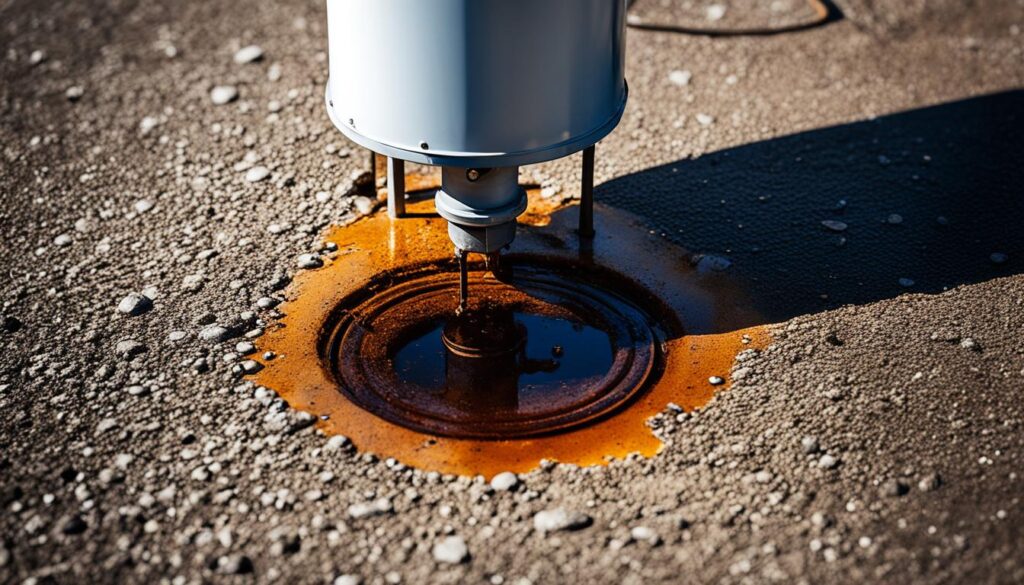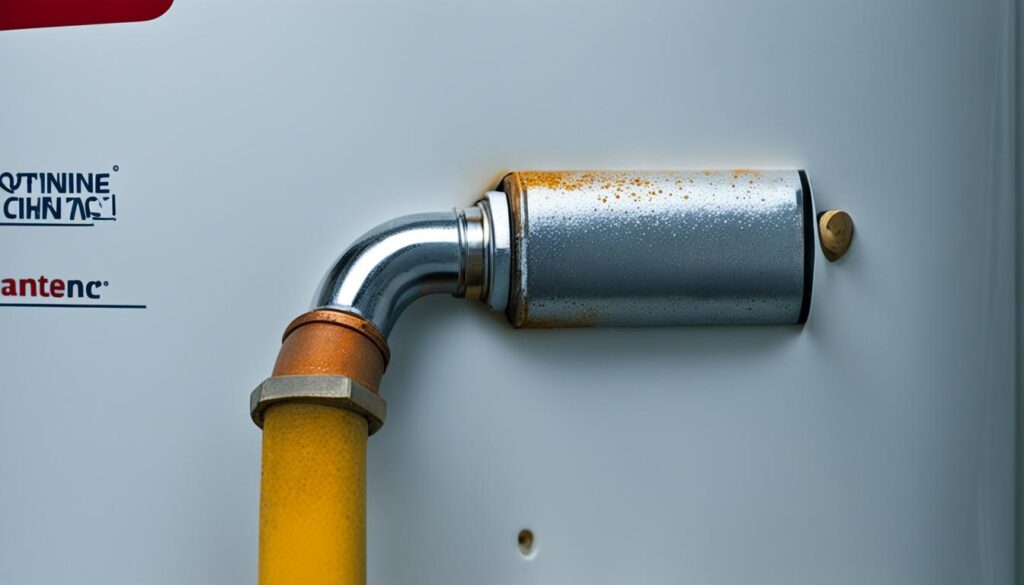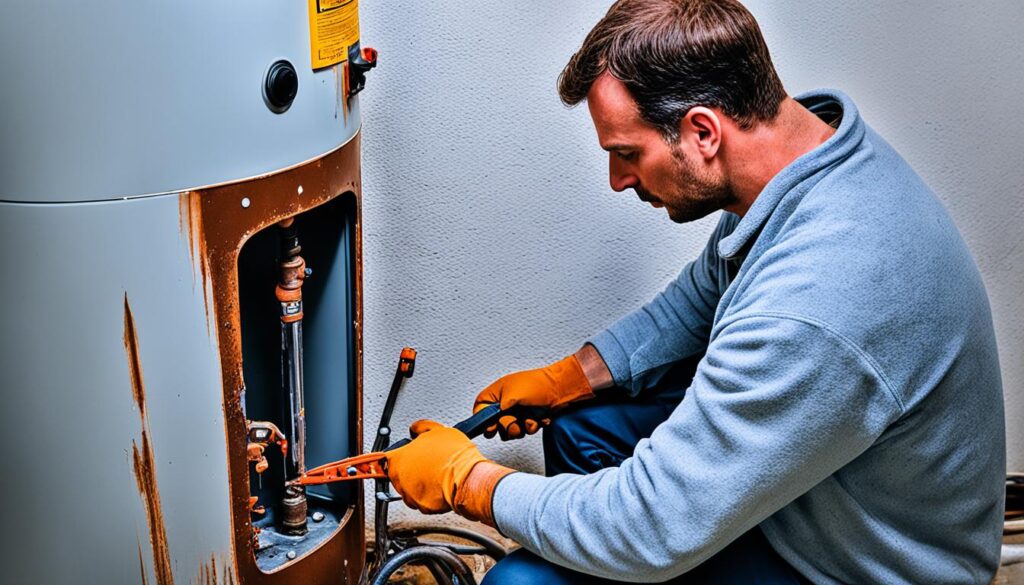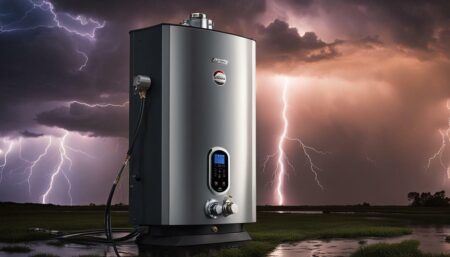Encountering rusty water leaking from your water heater can be quite startling. It’s an unmistakable sign that warrants immediate attention and prompts questions about the health of your plumbing system as well as the safety of your water. However, before you worry too much, know that there are definitive fixes and troubleshooting steps to identify and resolve such issues. Whether it’s a simple water heater leak repair or a complex problem requiring water heater replacement, a professional plumber can help you navigate through the technicality of it all. In some cases, a thorough water heater leak troubleshooting is all that’s needed to prevent potential property damage and ensure continued access to clean, hot water.
Many homeowners might not recognize the urgency behind a new, peculiar color in their water. But when your morning shower suddenly feels like a scene out of a horror movie, it’s clear that you need to consider new water heater options or water heater repair services. The causes can range from simple fixes to more grave concerns—all of which we’ll explore—ensuring you take the right steps towards clean, safe water.
Key Takeaways
- Understanding the reasons behind rusty water leaking from your water heater is key to solving the issue.
- Timely water heater leak repair can prevent more significant damage and save costs in the long run.
- Regular maintenance and inspection can prolong the life of your water heater and prevent unexpected leaks.
- If troubleshooting proves insufficient, a water heater replacement may be the most effective course of action.
- Consulting with a professional plumber can ensure that your water heater issues are diagnosed and corrected accurately.
- Opting for a new water heater could offer a more energy-efficient and long-term solution for your home.
Signs and Symptoms of a Failing Water Heater
Recognizing the early signs of trouble with your water heater can save both money and inconvenience. Paying attention to the subtle hints your water heater sends can be the key to preventing a minor issue from escalating into an expensive repair or replacement. Here’s how to tell if your water heater is on the fritz.
Discolored Water from Your Faucets
If you’ve noticed rusty water from the hot water heater when you first turn on the tap, do not ignore it. This discoloration is a classic sign of water heater leak or an internal issue. While water with a slight hue may appear harmless, it indicates signs of corrosion within your tank, pointing to the need for a potential inspection or repair.

Unusual Noises and Sediment Buildup
Another symptom to be wary of is a series of strange noises emanating from your water heater. Sounds such as popping, banging, or rumbling can signal sediment buildup, usually comprised of minerals and hard water scale that have hardened at the bottom of your tank. This buildup reduces efficiency and can increase the energy required to heat your water.
External Rust Spots Indicating Internal Damage
Visual inspection can also reveal the health of your water heater. If you spot rust or corrosion on the exterior, especially around the inlet or pressure relief valve, these are signs of water heater leak that can prelude further deterioration. Once corrosion initiates, it’s only a matter of time before it spreads, so these signs should never be neglected.
| Sign | Potential Causes | Recommended Action |
|---|---|---|
| Rusty Water | Corrosion of the tank’s interior | Consult a professional for assessment |
| Noises (Popping, Banging) | Sediment buildup at the tank’s bottom | Flush the tank to remove sediment |
| External Rust Spots | Corrosion spreading from the inside | Inspect for leaks; consider replacement |
Being alert to these signs of corrosion and dysfunction in your water heater can protect you from the unforeseen hassle of a complete water heater breakdown. Regular inspections and maintenance are your best defense against these common issues.
Identifying the Source of Rusty Water
When seeking the root of rusty water from the water heater, it’s crucial to observe when and where the discoloration occurs to accurately pinpoint the issue, be it a loose connection, corroded plumbing lines, or concerns with the pressure relief valve. Understanding the source not only guides in immediate rectification but also prevents potential complications associated with galvanized steel pipes and other plumbing fixtures.

Lead Due to Corrosion in Plumbing Lines
One common cause that needs thorough water heater leak detection is corrosion in plumbing lines, often due to aging galvanized steel pipes. Corrosion can lead to compromised water quality and leakage problems, necessitating a comprehensive review of the entire plumbing system.
Rusty Water from Hot Water Tap Can Point to Water Heater Issues
If noticing rusty water from the water heater, particularly when running hot water, the issues may range from internal corrosion to a failing heating component—all signs that your water heater may require urgent maintenance or replacement.
Cold Water Tap Discoloration and the Water Supply
Discoloration in cold water often points to broader issues beyond the water heater, like disturbances in the local water supply or deterioration within municipal lines. Vigilance and immediate investigation are necessary to identify and correct such widespread concerns.
| Scenario | Potential Cause | Recommended Action |
|---|---|---|
| Rusty water from hot water tap only | Water heater corrosion or malfunction | Inspect heating elements, tank, and pressure relief valve |
| Rusty water from both hot and cold taps | Problems within local water supply | Consult with local water authority |
| Discoloration in cold water exclusively | Corroded galvanized steel pipes | Professional plumbing assessment |
Common Causes of Rusty Water Leaking From Water Heater
Homeowners often find themselves facing the issue of rusty water leaking from their water heater. This can be disconcerting and requires immediate attention to prevent further damage and ensure clean water supply. Understanding the root causes is critical to finding an effective solution.
One primary culprit is the corrosion that occurs within the hot water tank. Over time, the internal tank can deteriorate, particularly if the sacrificial anode rod, which is designed to protect the tank from rust, fails or becomes completely corroded. Here, regular inspection and replacement are vital maintenance steps.
Bacteria in the water supply can also contribute to the rusty color and foul smell. This is often a result of stagnation or the presence of certain minerals that bacteria feed on. Using a water softener can help minimize these risks by controlling the minerals in your water.
- Corroded Water Heater Tank: Caused by long-term exposure to water, promoting rust and leaks.
- Sediment Buildup: Sediments settling at the bottom of the tank can cause discolored water and inefficiency.
- Bacterial Influence: Presence of bacteria can alter water color to a rusty hue.
- Failing Anode Rod: Anode rods are designed to corrode so that the tank does not, but over time they wear out.
- Inadequate Maintenance: Neglecting annual draining and flushing of the heater tank can lead to sediment and rust buildup.

To prevent these issues, homeowners are advised to perform routine maintenance, including inspecting heating elements and draining and flushing the heater tank at least once a year. This simple act can help prolong the life of a tank water heater and maintain the quality of hot water.
If you have spotted rusty water leaking from your water heater, don’t wait for the problem to escalate. Inspect your system to identify and rectify the issue promptly, ensuring a continued supply of clean and safe hot water.
Step-by-Step Fixes for a Leaking Water Heater
Encountering a rusty water leak emergency often signifies a need for water heater leak repair. From the top to the bottom of the tank, including crucial components such as the t&p valve, a careful inspection can prevent costly damages and ensure routine maintenance is up-to-date. Let’s explore the procedures to fix a leaking water heater effectively.
How to Properly Flush the Water Heater Tank
Flushing the water heater tank is a critical process in maintenance to prevent the accumulation of sediment that could lead to rusty water and damage. Here are the essential steps:
- Turn off the power supply to the heater and close the water inlet valve to prevent more water from entering the tank.
- Connect a garden hose to the drain valve located at the bottom of the tank and direct the hose to a place where the disposed water can safely drain.
- Open the drain valve, allowing the water and sediment to flow out of the tank. This may take some time, depending on the amount of sediment.
- After draining, cleanse the interior by turning on the cold water inlet valve, letting fresh water flow through the tank and out of the drain valve.
- Close the drain valve, disconnect the hose, and restore the water supply and power to the unit once the tank is full again.
Replacing a Faulty Anode Rod
The anode rod is central to preventing corrosion inside your water heater. To replace it:
- Ensure the water heater is powered off and carefully drain the tank as instructed above.
- Locate the anode rod on the top of the tank, generally identifiable by a hexagonal head.
- Unscrew and carefully extract the old anode rod. If it’s coated in sediment or appears eroded, it’s time for a new one.
- Insert the new anode rod, secure it in place, and refill the tank as previously mentioned.
Preparing for Potential Water Heater Replacement
If routine maintenance reveals significant issues at the bottom of the tank that can’t be remedied with simple repairs, water heater replacement may be necessary. Considerations include:
- Evaluating the size and energy efficiency of potential new units.
- Budgeting for upfront costs versus long-term energy savings.
- Anticipating future water usage needs to select the right tank capacity.
Making these considerations ahead of time simplifies the decision-making process during what could be a water heater crisis.
Conclusion
The appearance of rusty water can be unsettling, signaling a significant issue within your water heating system. Promptly addressing this concern not only ensures the quality of your water supply but also forestalls the likelihood of costly escalation. Adhering to regular maintenance is a cornerstone strategy that plays a vital role in safeguarding the operational integrity of your water heater. With focused attention on the inside of the tank, timely actions like annual flushing contribute to avoiding the accumulation of sediment and prevent corrosion.
The Importance of Regular Maintenance to Prevent Leaks
As homeowners recognize the need for regimen practices, involving professional plumber services for water heater maintenance becomes an invaluable measure. Periodical checks by experts not only aid in identifying any potential concern at its nascent stage but also ensure that the necessary repairs are executed with precision. This proactive diligence maintains the shutoff valve, cold water inlet pipe, and other integral components in prime condition, effectively mitigating the onset of a serious problem.
When To Call A Professional Plumber for Water Heater Repairs
Certain conditions, however, necessitate urgent intervention from water heater experts. Whether you’re facing persistent issues with the cold water tap or spotting tell-tale signs of leaks, reaching out to a skilled plumber can avert the prospective ramifications of a failing water heating system. These professionals, with their deep understanding, can detect and resolve the crux of leaks or corrosion, ensuring your home is protected from any significant water damage.
Options for Upgrading to a New Energy-Efficient Water Heater
Should the extent of damage denote a point of no return, the path forward may involve choosing a new water heater. Modern advancements like the tankless water heater offer a bevy of benefits, including greater energy efficiency and sustained savings. Models awarded with the Energy Star rating stand out as superior contenders, promising a future lined with environmental conscientiousness and optimized performance of home water heating systems. In navigating these waters, homeowners gain peace of mind by ensuring a constant supply of clean, hot water, void of the taint of rust and inefficiency.
FAQ
What should I do if I notice rusty water leaking from my water heater?
If you notice rusty water, the first step is to turn off the water supply and power to the heater. Inspect your water heater for any signs of leaks or rust, especially around connections and the pressure relief valve. If you cannot identify the source of the leak, contact a professional plumber for water heater leak troubleshooting and potential repair or replacement.
What are the signs and symptoms of a failing water heater?
Common signs include discolored water from your faucets, unusual noises like banging or popping from sediment buildup, and visible external rust spots on your water heater tank which may indicate internal damage.
How can I identify the source of rusty water?
Check whether the rusty water comes only from the hot water tap or both the hot and cold. If it’s only from the hot water tap, the issue likely lies within the water heater. If both taps dispense rusty water, it could be due to corroded plumbing lines. A professional diagnosis may be necessary to identify and fix loose connections or issues with the water supply if the problem persists.
What are the common causes of rusty water leaking from a water heater?
Causes can include corrosion within the hot water tank, sediment buildup, heating element failures, a deteriorating sacrificial anode rod, bacterial contamination in the water supply, and lack of proper maintenance. Using a water softener may help reduce the chances of corrosion and sediment buildup.
How do you properly flush a water heater tank?
To properly flush the tank, turn off the power or gas supply, connect a hose to the drain valve at the bottom of the tank, lead the hose to a safe area for water disposal, and then open the drain valve. Allow the tank to empty, then briefly turn on the cold water supply to help remove lingering sediment. Close the valve, refill the tank, and restore power or gas.
When should I replace a faulty anode rod?
The anode rod should be checked at least once every two years and replaced if it has been significantly depleted or is coated with calcium. Regular checking and replacement of this sacrificial anode rod can extend the life of your water heater by preventing corrosion.
What should I consider when preparing for a potential water heater replacement?
Consider the age and condition of your current water heater, energy efficiency ratings, the size of the heater needed to accommodate your household water usage, and whether a tankless water heater might be a better long-term investment. Seek advice from water heater experts and professional plumbers to ensure you make an informed decision tailored to your needs.
Why is regular maintenance important to prevent leaks in my water heater?
Regular maintenance, including routine inspections and tank flushing, can prevent sediment buildup, bacterial growth, and corrosion inside the tank, which are common causes of leaks. This helps extend the lifespan of your water heater and can prevent costly emergency repairs.
When should I call a professional plumber for water heater repairs?
If you suspect a leak, see rust or water around the base of your water heater, or experience any issues with water temperature or discoloration, it’s time to call a professional plumber. They have the expertise to diagnose the issue accurately and perform the necessary repairs or recommend a replacement if needed.
What options do I have for upgrading to a new energy-efficient water heater?
Upgrading options include tankless water heaters, which provide on-demand hot water and are more energy-efficient than traditional tank models. You can also consider high-efficiency tank water heaters or units with Energy Star ratings that promise better energy savings. Discuss with your plumber about the best heater based on your usage patterns and energy goals.






